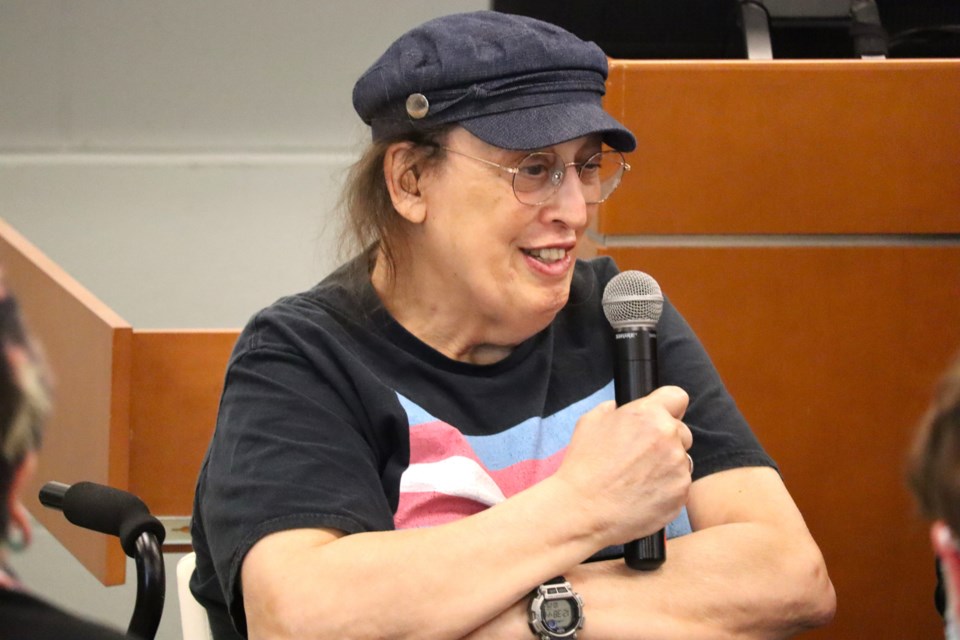Monica Helms was five years old when she prayed to God to be turned into a girl.
Growing up in a religious household in the 1950s, Helms had no like-minded individuals to look up to and zero resources to benefit from.
Despite her challenges from an early age, including hiding her true self as a member of the U.S. Navy, Helms eventually completed her transition and created the trans flag in 1999.
Now an internationally recognized trailblazer in the transgender community, the military vet was at Sault College this afternoon to provide advice, experience and education on the first stop of the nationwide 2024 Visibility Tour.
“I want people to be more educated in this,” she said. “I would like to see them learn a little bit of history about transgender culture. Not just the flag, but other things too. Education is what makes it less of a problem for people to hate upon us. The more we educate, the better it is.”
Sault Pride and Sault College partnered with the International Day of Pink to make Wednesday’s event possible.
This year’s tour is extra special for Helms as she celebrates the 25th anniversary of creating the trans flag, which features two light blue stripes, two pink stripes, and a white stripe in the middle.
Although it’s been a quarter of a century since the flag was created, Helms admitted it took some years for the symbol to get noticed on a wide scale.
“It was 2013 when I was looking at photos from Prides across the world,” she said. “I started seeing the trans flag in other places, and I’m going: ‘Oh my God, this is catching on.’ It was only 15 years old when I gave it to the Smithsonian. But that was a short period of time for something to become an icon item.”
“Over the course of time, I was taken aback that it started growing popular,” she added. “It was very exciting to see it in places you don’t see anything else. It’s been on all seven continents, including Antarctica, and on top of several of the tallest mountains in the world – but not Everest just yet.”
Aiming to help people understand the unique pain and anguish so many in the transgender community face, Helms wants those who challenge the idea to know it’s not a choice – it’s who they are.
“I couldn’t write, couldn’t read, and where was I going to get information about transgenderism in 1956?” she said. “Don’t tell me that it’s not something you’re not born with, because I definitely know it was.”
“As time has gone on, there’s always been some group that has been hated, segregated or discriminated,” she said. “Usually when those groups and their rights get recognized, the haters go on to hate somewhere else. We’re the next ones that everyone is going after.”
Among Helms’ bucket list items is to see the trans flag in the International Space Station, along with the rainbow flag.
Joining her on the Visibility Tour is Vincent Bolt, a social worker psychotherapist from Sudbury who has worked extensively with transgender children, teens, adults and their families.
He also took the opportunity at Sault College today to share his personal story with the community while expressing the importance of supporting people on their journey.
Without that support, Bolt didn’t mince words on the consequences that could transpire.
“There’s going to be more children in the morgue – that’s why it’s important, plain and simple,” he said. “If teens do not have the ability to transition and be themselves, they will die. The risk of suicide among trans youth who are fully supported by their parents decreases by 96 per cent. Access to gender affirming care when you’re a teenager is life saving and it is necessary.”
Bolt is currently working on his master’s thesis, which looks at the experience of 2SLGBTQ+ youth who have experienced homelessness in Sudbury.
He’s discovered through research that while the Pride community makes up about 10 per cent of the overall population, they represent 40 per cent of youth who are homeless.
“The primary reason why queer and trans youth end up homeless is because their parents do not accept them,” Bolt said. “It’s so important to work with families to ensure kids have a safe place to go home to. The reason they’re keeping it a secret is because it is not an environment where they can do that.”
Ecstatic to have Helms and Bolt share their experiences with locals today is Sault Pride chair Amanda Zuke, who describes their visit as “incredibly meaningful” to the city.
“Having the creator of the trans flag in Sault Ste. Marie is absolutely a top shelf honour,” she said. “We are so thrilled, and it really is a solid rallying point for the community. This is something that’s going to live in my memories forever.”
Zuke was the organizer of the counter-protest at the downtown library in January 2023 when the Drag Story Time event resulted in heated debates.
Duelling demonstrations met again at city hall last summer when arguments over 2SLGBTQ+ teachings in schools reached a boiling point.
The Sault Pride chair said an event like today served as a reminder of the efforts being made to protect those who are most vulnerable.
“We really think it’s important to get the facts out,” she said. “Nobody is grooming or changing kids. What we’re advocating when we do these counter protests is letting kids be themselves, and this ties into that very closely.”
“Understanding breeds acceptance, and from there, you can become an ally and a champion of their rights and freedoms,” she added. “We have this beautiful trans community in town, and we’re really happy to make this happen for them.”
